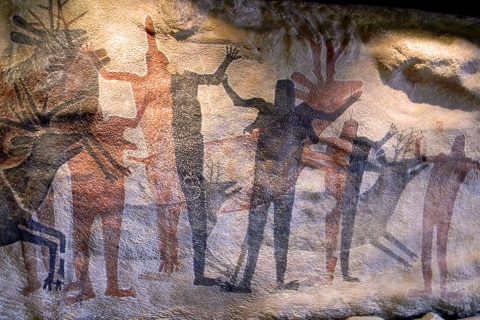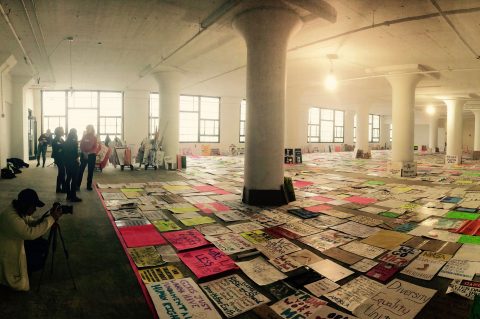Sociology (BA)
Why study Sociology?
We're social creatures. We live and die as members of — and contributors to — a society. As sociologists, we look at how societies are constituted in Canada and across cultures. As a student, you learn methods to systematically observe, investigate and analyze societies. You also think critically about social problems and social change.
Whether you study the self and identity or conduct large-scale research projects, our courses give you the opportunity to apply social science methods to nearly any situation: human rights, gender and sexuality, crime and justice, conflict and power, regional studies, even cyberspace.
While you study human behaviour, social interaction and organizational patterns, you also study the theory and process of social change, enhancing your thinking about the reasons for poverty, prejudice and other social problems.
Sociology’s many perspectives and methodological approaches will prepare you to make positive and effective social change in our society, or around the world.
Program highlights
- Gain hands-on research experience in community settings
- Study sociology through the lens of sustainability and global transitions
Special funding for out-of-province students
Up to $4000 for undergraduate programs.
Program structure
A Bachelor of Arts degree takes a minimum of three or four years (90 – 120 credits) of full-time study, depending on your academic background.
Program options
- Honours in Sociology (60 credits)*
The Honours program is a package of courses designed to ensure the highest quality learning experience for anthropology and sociology students. It includes courses that provide strong theoretical and methodological training with those that give students ‘hands-on’ experience conducting sociological and anthropological investigation and research. The program culminates in the Honours seminar (Soci 409) in which students are given the opportunity to conduct research from beginning to end — from the formulation of a topic to its investigation, analysis, and communication — all within a supportive and stimulating environment. Successful completion of this program will provide you with formal skills and credentials that will make you competitive in academic, public, and private sectors and an informal experience that will support your career and aspirations for the future.
- Specialization in Sociology (60 credits)
- Major in Sociology (42 credits)
- Minor in Sociology (30 credits)
*Honours is a highly concentrated program, ideal for students planning to continue to graduate studies. If you are interested in Honours, speak with your program advisor in your first year of study at Concordia. Students applying to the University are able to apply to the major or specialization.
Courses
Co-op program
The Co-op program gives you the chance to complete paid work terms over 12 to 16 weeks. Co-op students graduate with job-search skills, enhanced personal and professional skills as well as a year’s worth of work experience. As a Co-op student, you will work on projects designed and implemented by professionals, making it possible for you to:
- Conduct research connected to ongoing projects focused on social economy or community
- Engage in data or program analysis
- Use statistical and graphics software, spreadsheets and database management tools
United States students: A U.S. Federal Student Aid-eligible version of this program is offered. This version meets all U.S. regulations (such as no co-operative education or e-courses) for eligible programs.
Admission criteria
Minimum cut-off averages and course requirements
- Quebec CEGEP: 22
- High School: B-
- ACT or SAT is NOT required
- Canadian curricula course requirements
- Accepted international qualifications
- International Baccalaureate (IB) diploma: 27
- International Baccalaureate Career-related Programme (CP): 4.5/7
- Baccalauréat français: 12
- British system of education (GCE):
- A-levels: At least two A-level exams CD or
- AS-levels: At least 4 AS-level exams with equivalent results or
- BTEC: Level 3 Diploma or Extended Diploma in a related subject area with equivalent results
- Additional information for British System of Education (GCE) applicants
- University Transfers (internal/external): B-
Minimum cut-off averages should be used as indicators. The cut-off data may change depending on the applicant pool. Applicants who meet the stated minimum requirements are not guaranteed admission to these programs.
Application deadlines

FALL ENTRY (September)
Deadline: March 1
U.S. and international applicants: Apply no later than February 1 to allow time for immigration document processing. However, applying earlier is strongly recommended. Immigration processing times vary by country and delays could prevent you from starting your studies on time.

WINTER ENTRY (January)
Deadline: November 1
U.S. and international applicants: Apply no later than August 1 to allow time for immigration document processing. However, applying earlier is strongly recommended. Immigration processing times vary by country and delays could prevent you from starting your studies on time.
We reserve the right to close admission to a program at any time after the official deadline without prior notice.
After your degree
Because social science forms the backbone of so much of today’s work, both in the public and private sectors, the fundamental skills you learn in our program will equip you to make structured and informed decisions, in any profession, including:
- Government and business
- Market research
- Urban planning
- Human resource work
Student story

Alanna Mitchell
Major in Sociology
After transferring to Concordia, Alanna Mitchell allowed her background in planning to guide her path forward.

Chloé-Ann Berce
Specialization in Sociology (Co-op) Minor in Interdisciplinary Studies in Sexuality
Critical thinking skills, combined with expertise in statistics, led Chloe-Ann Berce to expand her comfort zone at two different internships.
Other programs of interest

As an anthropologist, you study what it means to become a person in Canada and around the world. By systematically observing and investigating cultural life in diverse human societies, you’ll understand that much of what we assume to be natural is, in fact, constructed by our culture.
Department
Department of Sociology & Anthropology
Faculty

As an anthropologist, you study what it means to become a person in Canada and around the world. By systematically observing and investigating cultural life in diverse human societies, you’ll understand that much of what we assume to be natural is, in fact, constructed by our culture.
Department
Department of Sociology & Anthropology
Faculty

We are one of the most established and respected Communication Studies programs in North America, and are well known for combining creative media production with the study of media theory, criticism and history.
Department
Department of Communication Studies
Faculty


